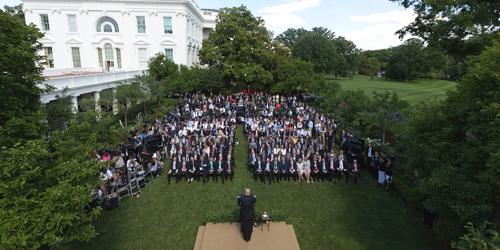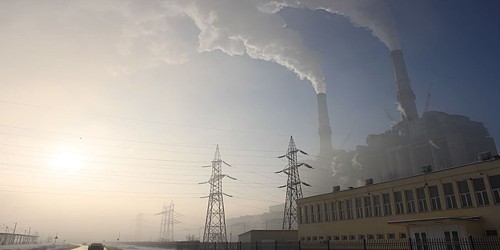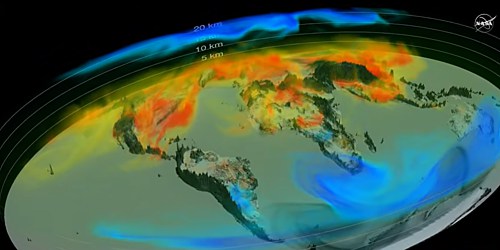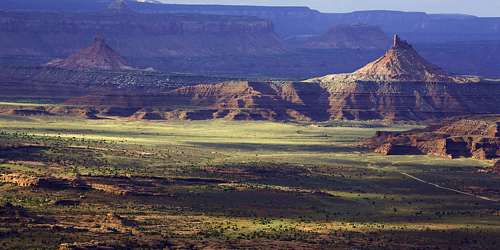Concerns For Science
Attacks on Science in America for four years from 20 Jan 2017
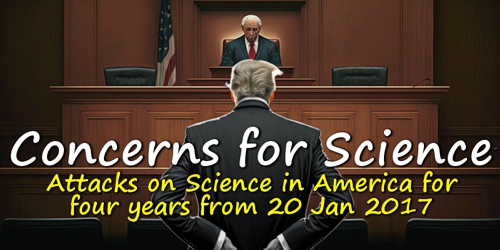
On 20 Jan 2017, a man raised his hand to echo an oath of office as the new president of the U.S. He was not trained as a lawyer and had zero experience as a legislator. The majority of the voters in the election the previous November had delivered the popular vote to the best-qualified candidate, the Democrat Hillary Clinton. (She was a former Senator, and Secretary of State.) As a measure of the Republican’s incompetence, during his time in the White House, history records that he was impeached not just once, but twice.
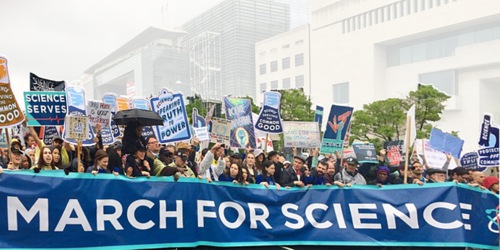
Within just a few months, on 22 Apr 2017, in Washington, D.C., and eventually more than 600 other cities across the world, the first March For Science took place. It was a strong reaction to the attacks on science coming from the Oval Office, thwarting the work of professional scientists across American, with side effects on scientists around the world.
Since the concerns of scientists extended throughout the four years of the administration from 20 Jan 2021, it is well worth a memory refresher on the many negative actions during that time. Described below is a selection of the controversial actions taken by the administration during four years from 20 Jan 2017, that have been criticized as potentially harmful to the scientific community. Suitable follow-up links have been added by Webmaster.
Budget cuts and reduced funding
The administration proposed and implemented budget cuts to several federal agencies responsible for scientific research, including the National Institutes of Health (NIH), the Environmental Protection Agency (EPA), and the National Science Foundation (NSF).
While Congress often pushed back against these proposed cuts, they nonetheless sent a message about the administration's priorities regarding scientific research and development. These budget cuts threatened to hamper progress in critical areas such as biomedical research, environmental science, and renewable energy.

Climate change skepticism

From Jan 2017, the Republican president’s outright climate change skepticism was a defining feature of his administration's approach to environmental policy. Despite overwhelming scientific evidence and consensus among climate scientists that human activities are driving global warming and climate change, he frequently dismissed these findings. Worse, he insyead propagated skepticism about the reality and severity of climate change.
Most notoriously, he denounced climate change as a “hoax,” on frequent occasions, both before and during his presidency. He repeatedly used the derogatory term to downplay the urgency of addressing climate change. This cast doubt on the motives behind efforts to combat it. His rhetoric both contradicted scientific consensus and also influenced public perception and policy decisions affecting climate change mitigation efforts. This had far-reaching implications, hindering progress for efforts to address one of the most pressing global challenges of our time. The time for action that was squandered can never be regained.
His decision to withdraw the United States from the Paris Agreement in 2017 was perhaps the most significant damage of his stance on climate change. The Paris Agreement, adopted by nearly every country in the world in 2015, represents a landmark international commitment to combat climate change by limiting global warming to below 2 degrees Celsius above pre-industrial levels. By withdrawing from the agreement, his administration signaled a disregard for multilateral efforts to address climate change and effectively abdicated U.S. leadership on this crucial issue.
In addition, his administration pursued a series of rollbacks to environmental regulations aimed at mitigating climate change. These rollbacks targeted various policies implemented under the Obama administration, including the Clean Power Plan, which aimed to reduce carbon emissions from power plants, and fuel efficiency standards for vehicles. By weakening or dismantling such regulations, the administration prioritized the profit interests of certain industries over environmental concerns, further exacerbating the challenges posed by climate change.
Censorship of scientific information
The administration has been accused of suppressing or altering scientific information, particularly related to climate change. For example, some reports suggest that officials at the EPA and the Department of the Interior were instructed to remove mentions of climate change from their websites and publications.
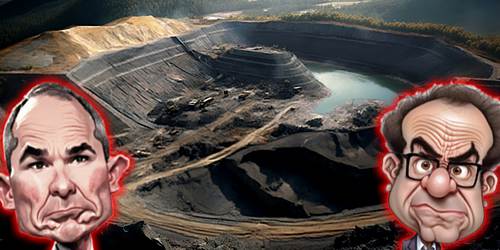
Appointing non-experts to key positions

Critics argue that individuals were appointed to several to key scientific and environmental positions who lacked relevant expertise or even were ideologically opposed to the mission of the agencies they were tasked to lead. This includes Scott Pruitt and Andrew Wheeler, who both led the EPA despite having a history of opposing environmental regulations.
Disregarding scientific advice during the COVID-19 pandemic
The administration for four years from 20 Jan 2017, was criticized for its handling of the COVID-19 pandemic, with critics arguing that the administration often disregarded scientific advice and downplayed the severity of the virus. This includes promoting unproven treatments, such as hydroxychloroquine, and contradicting guidelines from public health experts.
There were accusations of politicization and interference in the messaging and decision-making of agencies like the CDC and the Food and Drug Administration (FDA). This led to confusion and mistrust among the public, as scientific guidance and recommendations were sometimes overshadowed by political considerations.
EPA’s “secret science” rule
The administration’s Environmental Protection Agency (EPA) finalized a rule referred to as the “secret science” rule (Strengthening Transparency in Regulatory Science) on 5 Jan 2021. This rule restricted the EPA from using scientific studies that do not disclose all raw data, which could exclude many epidemiological and public health studies that rely on confidential patient data. Critics argue that this rule undermines the use of well-established scientific research in policy-making.
Reassignment of climate scientists
During Jun 2017, the administration reassigned several scientists working on climate change adaptation within the Department of the Interior. These reassignments were viewed as an attempt to sideline climate science and hinder research on the impacts of climate change on natural resources.
Withdrawal from the Paris Agreement
From the Rose Garden on 1 Jun 2017, it was announced that the United States was withdrawing from the Paris Agreement, an international treaty aimed at combating climate change. This decision was widely criticized by scientists, as it signaled a retreat from global efforts to address climate change and reduced the U.S. government’s commitment to support climate-related research.
Reduction of scientific advisory committees
The administration issued an executive order (No. 13875) on 14 Jun 2019, directing federal agencies to eliminate at least one-third of their scientific advisory committees. These committees play an essential role in providing expert advice to inform policy decisions. Reducing their numbers was seen as undermining the importance of scientific input in government decision-making.
Rescinding methane emissions regulations
On 29 Aug 2019, the administration rolled back Obama-era regulations that aimed to reduce methane emissions from oil and gas operations. Methane is a potent greenhouse gas, and many scientists consider regulating its emissions crucial in the fight against climate change. The rollback was widely criticized as being harmful to the environment and ignoring scientific consensus.
Reducing the role of science in the Endangered Species Act
Changes to the Endangered Species Act were announced by the administration on 12 Aug 2019. By reducing the role of scientific assessments in listing decisions, the changes were potentially making it easier for economic considerations to outweigh scientific ones. The changes were seen as weakening protections for endangered species and undermining the importance of science in policy-making.
Dissolution of the National Climate Assessment Advisory Panel
The administration disbanded the federal advisory panel for the National Climate Assessment on 20 Aug 2017. This group of fifteen experts was tasked with helping policymakers and private-sector officials incorporate the report’s climate analysis into long-term planning. This decision was criticized for reducing the role of science in shaping climate policy and planning.
Repeal of the Clean Power Plan
On 19 Jun 2019, the administration repealed the Clean Power Plan, an Obama-era policy aimed at reducing greenhouse gas emissions from power plants. The plan was replaced with the Affordable Clean Energy (ACE) rule, which was considered less effective in reducing emissions. This rollback was seen as a step backward in combating climate change and disregarding scientific consensus on the need to reduce greenhouse gas emissions.
Cancellation of NASA’s Carbon Monitoring System
The administration cancelled NASA’s Carbon Monitoring System (CMS) on 9 May 2019. This was a program that monitored global carbon emissions and their impact on climate change. The decision was criticized for hindering the ability to track and understand the flow of greenhouse gases, which is crucial for climate change research and policy-making.
CDC language restrictions
It was reported on 15 Dec 2017 that the administration prohibited officials at the Centers for Disease Control and Prevention (CDC) from using certain words and phrases, such as “evidence-based” and “science-based,” in budget documents. Although the administration later denied imposing a ban, the initial report alarmed scientists and public health advocates, who saw it as an attempt to undermine the role of science in public health policy.
Alteration of scientific reports on climate change
Reports emerged on 11 Sep 2020 that administration officials at the National Oceanic and Atmospheric Administration (NOAA) had altered scientific reports on climate change to downplay the severity of the issue. This interference with scientific reports was seen as an attempt to undermine scientific integrity and credibility.
Revocation of California’s authority to set stricter vehicle emissions standards
On 18 Sep 2019, the administration revoked California’s authority to set its own vehicle emissions standards, which were stricter than the federal standards. This decision was criticized as an attack on states’ rights to take more ambitious actions against climate change and a rejection of scientific evidence on the benefits of reducing greenhouse gas emissions.
Rescinding the Waters of the United States rule (WOTUS)
The administration repealed the Waters of the United States rule on 12 Sep 2019, an Obama-era regulation that extended federal protection to many small streams, wetlands, and other water bodies. The decision was criticized for prioritizing economic interests over environmental protection and disregarding scientific evidence on the importance of these water bodies for the health of ecosystems and human communities.

Relocation of USDA research agencies

The administration announced on 13 Jun 2019 the relocation of two key research agencies within the U.S. Department of Agriculture (USDA) from Washington, D.C., to Kansas City. Many scientists and former USDA officials criticized the move as an attempt to undermine the research capabilities of the Economic Research Service (ERS) and the National Institute of Food and Agriculture (NIFA), as a significant number of employees chose not to relocate, leading to a loss of experienced staff.
Rescinding the National Ocean Policy
An executive order was issued on 19 Jun 2018, revoking the National Ocean Policy, which was established by the Obama administration in 2010 to provide a comprehensive framework for managing and conserving U.S. ocean resources based on scientific research and collaboration among stakeholders. The decision to replace it with a less comprehensive policy was seen as a step backward in addressing the complex challenges facing the nation’s oceans, coasts, and Great Lakes.

Howe Ridge Fire in Montana’s Glacier National Park (12 Aug 2018).
Detail from cover of Report of Fourth National Climate Assessment. Photo credit: NPS. (source)
Ignoring the Fourth National Climate Assessment

Detail from cover of Report of Fourth National Climate Assessment. Photo credit: NPS. (source)
The Fourth National Climate Assessment, a comprehensive report produced by 13 federal agencies, warned of the severe consequences of climate change for the United States. However, on 23 Nov 2018, the report’s findings were summarily dismissed: “I don’t believe it.” This response was criticized for disregarding the scientific consensus on climate change and its impacts, as well as undermining the work of hundreds of scientists involved in producing the assessment.
Proposal to eliminate the Advanced Research Projects Agency-Energy (ARPA-E)
The administration’s first budget proposal, on 16 Mar 2017, called for the elimination of the Advanced Research Projects Agency-Energy (ARPA-E), an agency that invests in high-risk, high-reward energy research. Although Congress ultimately rejected this proposal, it signaled the administration’s willingness to cut funding for scientific research and innovation in the energy sector.

Weakening the Migratory Bird Treaty Act

The administration issued on 22 Dec 2017, a legal opinion reinterpreting the Migratory Bird Treaty Act (MBTA) in a way that effectively removed penalties for unintentional harm to migratory birds, such as those caused by oil spills or wind turbines. This reinterpretation was criticized for undermining the original intent of the law and disregarding scientific evidence on the importance of protecting migratory bird populations.
Reduction of the size of national monuments
The administration announced the largest reduction of protected lands in U.S. history on 4 Dec 2017, significantly shrinking the size of two national monuments in Utah, Bears Ears and Grand Staircase-Escalante. This decision was criticized for opening up these areas to potential mining, drilling, and development, disregarding scientific and archaeological research on the importance of preserving these ecosystems and cultural sites.

Rollback of Offshore Drilling Safety Regulations

The administration moved on 28 Dec 2018, to roll back safety regulations implemented in response to the 2010 Deepwater Horizon oil spill. These regulations were put in place to help prevent future disasters and protect the environment. Critics argued that rolling back these regulations disregarded scientific evidence on the importance of environmental and worker safety in the oil and gas industry.

Suspension of the National Academies Study on the Health Effects of Mountaintop Removal Coal Mining

On 21 Aug 2017, the administration ordered the suspension of a study conducted by the National Academies of Sciences, Engineering, and Medicine that was investigating the potential health effects of mountaintop removal coal mining on nearby communities. Critics argued that halting the study was an attempt to suppress scientific evidence on the potential health risks associated with this form of mining.
Rescinding the BLM Methane Waste Prevention Rule
The administration rescinded on 18 Sep 2018, the Bureau of Land Management (BLM) Methane Waste Prevention Rule, an Obama-era regulation aimed at reducing methane emissions from oil and gas operations on federal and tribal lands. Methane is a potent greenhouse gas, and the rule’s rollback was criticized for being harmful to the environment and for disregarding scientific evidence on the climate impact of methane emissions.
Overall, during four years from 20 Jan 2017, the U.S. administration’s deconstructive approach to science was marked by skepticism, political interference, and a prioritization of short-term economic interests over long-term environmental and public health concerns. These actions not only undermined the credibility of scientific institutions but also posed significant challenges to addressing pressing global issues such as climate change and public health emergencies.
These actions have led some to argue that the administration for four years from 20 Jan 2017 undermined scientific research and the role of science in informing public policy. However, it is important to note that perspectives on these issues can be subjective, and not everyone may agree with this characterization.


